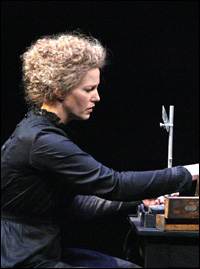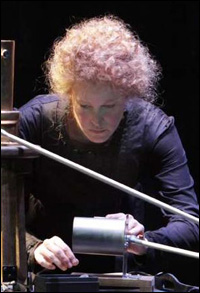
*
Alda has won Emmy Awards for playing Hawkeye Pierce on TV's "M*A*S*H" (and for guesting on "The West Wing") and was Tony Award-nominated for acting in Glengarry Glen Ross, The Apple Tree and Jake's Women. He's also an Oscar nominee for his work in "The Aviator." As a screenwriter and director, his credits include "The Seduction of Joe Tynan," "Betsy's Wedding," "A New Life," "The Four Seasons" and "Sweet Liberty." Fewer people know that he's a longtime science buff and former host of the PBS series "Scientific American Frontiers." Now in his 70s, Alda took his passion for science — and particularly his devotion to Polish-French Nobel Prize-winning scientist Marie Curie — and came up with a play, Radiance: The Passion of Marie Curie, now playing an extended run at the Geffen Playhouse in Los Angeles. He gave us a few minutes by telephone.
How did Radiance come about? Was it suggested to you or was this always brewing inside of you?
Alan Alda: I have a strong interest in science and I'm always reading about it, and I help put on the World Science Festival every year in New York. We mix science and performing arts in the World Science Festival. Four years ago, I thought it would be a good idea to do a reading of Marie Curie's letters, which would be easy for actors to rehearse. They can rehearse it and perform it all in the same day, and if you put letters together right, you can get an actual play out of it. I started to do a little bit more research on it, and I found that the letters are all in the library in Paris — the National Library — but they're still radioactive. You have to sign a release before you read them, recognizing that you could become ill after touching the letters, so I switched to Einstein. I did, indeed, make a play of Einstein's letters. But, in the course of researching, I realized that her story is so powerful, her professional and her personal story, especially between the two Nobel Prizes in 1903 and 1911. I really wanted to write a whole play about it and deal with that part of her life, which is extremely dramatic and important — not only as a look into the science of the time because she helped revolutionize physics, but also because of the growth that she had to go through as a person in that period. The things that she had to overcome were monumental just on a personal level.
| |
 |
|
| Anna Gunn in Radiance. | ||
| photo by Michael Lamont |
AA: Yeah, of course. Her story is so human — and I don't pull back from her flaws or her human traits. She's not an ideal. She's not simply an iconic scientist. She's a human like the rest of us, and actually because of that, that makes her more of a hero to me. She's my personal hero because she had so many obstacles — some of them brought about by mistakes and judgments on her part, but mistakes that she almost couldn't avoid because she was so vulnerable. After her husband died, she was very depressed — came close to suicidal — and needed to be brought out of that. The love of this other scientist, Paul Langevin, was, I think, her salvation. The only problem was that he was married to a woman who was very erratic and threatened Marie's life, so it gets very rich with human trauma.
There is a sexual side to her. She's not all brain.
AA: The subtitle, The Passion of Marie Curie, refers to her passion both for science and for the people she loved, and the play deals with both of those. She adored Pierre Curie, her husband. Unfortunately, he died in an accident that could have been partly brought on by radiation poison. She had such a strong relationship with the ground-breaking events that were taking place in her own mind that I doubt that she could've had a relationship with another person who couldn't appreciate and support that. She and Pierre were committed to a life together — of the mind and of each other. They were, really, a perfect fusion of thought and physical love and emotional love.
| |
 |
|
| Anna Gunn in Radiance | ||
| photo by Michael Lamont |
AA: No, it takes place in actual time. I wrote it with a very theatrical device in mind, which is that the actors come out on stage to tell us this story, to play out the story, but they sit on stage during the play and they rise out of their chairs to play scenes as they occur, so it's a very frank kind of presentation.
Weren't you a science major?
AA: No, I got a bachelor of science in social sciences, so it sounds like I'm in science, but it was only because in those days, at that college, you were expected to know Greek and Latin, and if you didn't — if you didn't have a background in Greek and Latin — they wouldn't give you a bachelor of arts degree. That's how much times have changed. Now you don't even have to know English.
This was Fordham, right? So, it was a bachelor of science in social sciences.
AA: Yeah. That's like the least interesting science degree they could give you! [Laughs.]
No test tubes?
AA: No, I had one experience one summer with test tubes. I took a course in chemistry because my father wanted me to be a doctor, and I really didn't want to be a doctor. I did poorly in the chemistry class, partly because I didn't want to do it and partly because they didn't know what they were talking about. They never even explained that chemistry had something to do with electrons. I swear to God, they never mentioned that! [Laughs.] I did terribly in it, I cut all my fingers breaking pipettes, so I was bloody all the time and failed miserably, and I really am sorry. I regret that. I wish I had learned chemistry because I had to teach myself over the years.
You're constantly curious about science?
AA: Oh, yeah, of course. I don't read fiction. I read science because that's where the poetry is. Dan Sullivan is one of the great American directors, and has shepherded new plays like Proof and Rabbit Hole. What's your director-playwright relationship like?
AA: It's wonderful. I think that we have a very open collaborative spirit that works between us. One of the wonderful things about Dan — he's really good — [is that] he has this really uncanny ability to picture from the words of the play what is in there for the audience…so that it really takes place in the audiences' emotions and their intellect. What he did, for instance, in Merchant of Venice was amazing. It was extraordinary. He took a play that probably was anti-Semitic when it was first presented and, without changing any of the words, showed you what was in there that was affirmative and humane.
You've written screenplays. Why haven't you written a play before this?
AA: I've been writing and writing plays all my life, but this is the first one that I wanted to see produced. I come from the stage. Even when I write movies, I write them more like plays than movies sometimes.
Are there other plays inside of you?
AA: I'm sure I'll write more plays. I love the stage, but this is all I can think of right now.
Kenneth Jones is managing editor of Playbill.com. Follow him on Twitter @PlaybillKenneth.











